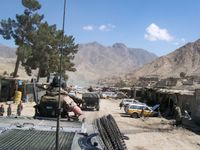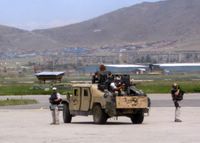Afghanistan: ISAF
 Germany's Bundeswehr has currenty some 7000-8000 soldiers sent out all over the world. The biggest operations are Enduring Freedom (1800 soldiers), ISAF (2500 soldiers) in Afghanistan (English Link), KFOR (2700 soldiers) and EUFOR (1000 soldiers) in the Balkans beside UN observer missions, support of Allied stabilisation efforts for Iraq and operations in Ethiopia & Eritrea and the Mediterranean Sea. In contrast to other armies, the Bundeswehr is a conscript army with 257,000 military and around 125,000 civilian personnel. Its role is described in the Grundgesetz (German Basic Law) as being defensive only (Article 87a (1):
Germany's Bundeswehr has currenty some 7000-8000 soldiers sent out all over the world. The biggest operations are Enduring Freedom (1800 soldiers), ISAF (2500 soldiers) in Afghanistan (English Link), KFOR (2700 soldiers) and EUFOR (1000 soldiers) in the Balkans beside UN observer missions, support of Allied stabilisation efforts for Iraq and operations in Ethiopia & Eritrea and the Mediterranean Sea. In contrast to other armies, the Bundeswehr is a conscript army with 257,000 military and around 125,000 civilian personnel. Its role is described in the Grundgesetz (German Basic Law) as being defensive only (Article 87a (1): The Federation shall establish Armed Forces for purposes of defense.), but since the end of the Cold War the Bundeswehr is undergoing a transformation to adapt to the new and fast-paced changing global security issues.
 One of my friends I know since highschool times decided to join the Bundeswehr right after school. It's not his first time abroad, but he's currently in Afghanistan with the ISAF. Last week I recieved several interesting pictures and videos, of which I added three images to this post. If you're looking for other - officially approved - pictures about ISAF, try their website. Stationed at Camp Warehouse, which is the is the operations center for the multinational force in Kabul (کابل)- it's hot, dusty and every now and then a rocket hits a camp as on May 30th. I'm following the news about ISAF closely, like two days ago, when the two German soldiers who got killed last week, arrived at Köln-Wahn airport. I hope my friend will come back in one piece.
One of my friends I know since highschool times decided to join the Bundeswehr right after school. It's not his first time abroad, but he's currently in Afghanistan with the ISAF. Last week I recieved several interesting pictures and videos, of which I added three images to this post. If you're looking for other - officially approved - pictures about ISAF, try their website. Stationed at Camp Warehouse, which is the is the operations center for the multinational force in Kabul (کابل)- it's hot, dusty and every now and then a rocket hits a camp as on May 30th. I'm following the news about ISAF closely, like two days ago, when the two German soldiers who got killed last week, arrived at Köln-Wahn airport. I hope my friend will come back in one piece.My friend also told me that lots of mercenaries are hired to replace military U.S. troops. PBS published an indepth report about private warriors. Right now, around 120,000 mercenaries are in Iraq - outsourcing call centers and support desks, alright, but outsourcing troops is not in the same league. War is too important to be left to companies - where's the legal framework for private military firms anyway - if they loose control who's liable?
Plans to split the forces into three major parts - intervention, stabilization and support forces - are accompanied by a strong reduction of the overall size. Right now, it happens that draftees sue because the equity of conscription for all male youths is not kept - if you're 23, married or have been categorized as T3, you're not drafted anymore. Also, since the European Court of Justice opened up military service to women, there are around 12,000 women serving in the Bundeswehr.
 For years, there have not only been developements to transform the Bundeswehr to a more modern army, but also to change its very basic structure and abolish the conscript system. The FDP as well as the Green Party are for it, the SPD and CDU want to keep it. While some seem to think a professional army would cost less, experiences of other countries have shown that cost is not a factor. The major difference between a conscript and professional army is the purpose and the intended effect on society. A conscript army can't provide as many ready-for combat troops, since most soldiers serve as draftees for a certain time (nine months in Germany) and are not fit for deployment, but a citizen in uniform has a positive effect on the society a professional army never could. A conscript army comes with another perk: Youths who don't want to join the army do civilian service - loosing that support, many social institutions would have extreme problems to keep up their service for elderly, handicapped people etc.
For years, there have not only been developements to transform the Bundeswehr to a more modern army, but also to change its very basic structure and abolish the conscript system. The FDP as well as the Green Party are for it, the SPD and CDU want to keep it. While some seem to think a professional army would cost less, experiences of other countries have shown that cost is not a factor. The major difference between a conscript and professional army is the purpose and the intended effect on society. A conscript army can't provide as many ready-for combat troops, since most soldiers serve as draftees for a certain time (nine months in Germany) and are not fit for deployment, but a citizen in uniform has a positive effect on the society a professional army never could. A conscript army comes with another perk: Youths who don't want to join the army do civilian service - loosing that support, many social institutions would have extreme problems to keep up their service for elderly, handicapped people etc. On the other hand, a professional army would enable Germany to increase its participation for global security, affirm its claim for a seat in the UN security council, but at the same time "locate" the army outside German society, compared to the current condition and would probably be even more expensive (German politicians who want to raise the budget - say, for a bigger contribution on the international stage - have a hard time defending their stance). Professional soldiers have a different motivation and such troops basically make more sense in regard to the current global political situation. Nevertheless: As long as the issue of a looming omission of the civilian service and the overall political and societal impact is not properly addressed to, a switch to a professional army is probably a bad idea. It needs to be done, but done the right way.
N.B.: Since most links in this posting lead to German sites, you might want to try Babelfish to translate the content into English or French.
» Post a Comment